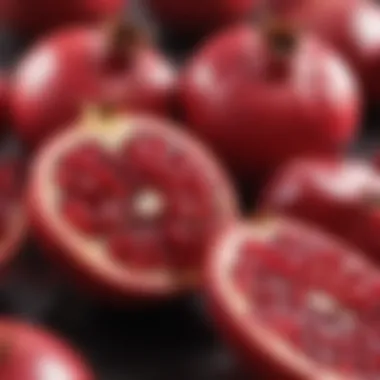Fruits for Cancer: Exploring Their Healing Potential


Intro
The intersection of diet and health has received considerable attention in recent years. Among the myriad of dietary components under scrutiny, fruits stand out as a potent class of foods with potential benefits in the realm of cancer prevention and management. This exploration underscores a significant layer in the understanding of how natural foods can interact with human biology, particularly through their unique phytochemical profiles.
Not only are fruits a rich source of vitamins and minerals, but they also harbor compounds that might exhibit anti-cancer properties. By deciphering the intricate relationships between various fruits and cancer, we uncover insights that could inform dietary choices, potentially enhancing conventional treatment methods.
Whether you’re a student of nutrition, a dedicated researcher probing the mysteries of cancer, or a professional seeking to enrich patient knowledge, this article serves to provide a detailed examination of fruits that may play a role in cancer care. Through highlighting specific fruits and their mechanisms, we aim to foster a deeper understanding of how these natural wonders can contribute to overall health.
The Significance of Diet in Cancer Management
The connection between diet and health has been a topic of discussion for decades, but when it comes to cancer management, this relationship becomes even more crucial. Foods can either pave the way for good health or swirl the body into undesirable directions. In the realm of oncological care, the dietary choices made by patients can have profound implications on treatment efficacy, recovery rates, and overall quality of life.
Several key areas underline the significance of nutrition in managing cancer:
- Aiding Treatment Outcomes: A balanced diet rich in fruits, vegetables, and whole grains can bolster the immune system, which is often weakened due to cancer and its therapies. Proper fuel can be vital during chemotherapy or radiation when the body is under stress.
- Mitigating Side Effects: Many cancer treatments come with a cocktail of side effects, from nausea to fatigue. Certain foods, particularly those loaded with vitamins and antioxidants, may help alleviate these symptoms, making the journey a tad smoother.
- Maintaining Body Weight: Cancer and its treatments can lead to dramatic weight changes, whether it’s loss or gain. A wholesome diet ensures that patients maintain a healthy weight, helping them to avoid additional complications.
"The phrase 'you are what you eat' takes on new meaning in the context of cancer management. The right foods can fortify the body against illness and improve resilience in the face of treatment."
To discern this relationship, one must understand what cancer is at its core, how it develops, and how nutritional choices impact this progression.
Understanding Cancer
Cancer, fundamentally, is an umbrella term for a group of diseases characterized by uncontrolled cell growth. These rogue cells can spread to other parts of the body, forming new tumors and disrupting normal bodily functions. Environmental factors, genetics, and, notably, lifestyle choices such as diet and exercise play pivotal roles in the development and trajectory of cancer.
The significance of understanding cancer lies in recognizing that it is not a one-size-fits-all condition. Different types of cancers respond uniquely to treatments; hence, a tailored dietary plan becomes a potential ally in the fight. For instance, colorectal cancer has different dietary influences than leukemia, underscoring the need for individualized nutrition strategies.
Role of Nutrition in Cancer Therapy
Nutrition should not be an afterthought in cancer therapy. It’s more than just a supportive measure; it can be seen as an integral component of the treatment landscape. Evidence suggests that certain nutrients play a role in enhancing the effectiveness of chemotherapy and radiotherapy.
- Enhancing Tolerance to Treatment: Foods rich in antioxidants, like fruits, may help protect normal cells from damage during treatment, lessening the impact of side effects and allowing patients to stick to their treatment schedule.
- Role of Specific Nutrients: Nutrients such as Vitamin D and Omega-3 fatty acids have been shown to influence cancer cell behavior and immune response positively. Constant research focuses on how macronutrients and micronutrients can potentially alter cancer pathways or cell responses.
Moreover, the psychological implications of nourishing foods should not be ignored. Consuming fruits and veggies isn’t solely about physical health; it also feeds into a patient’s psychological wellness, instilling a sense of control and empowerment in the treatment journey.
In sum, the significance of diet in cancer management intertwines with understanding cancer itself and recognizing how nutrition plays a proactive role in therapy. This comprehensive perspective aids individuals—from healthcare professionals to patients—in navigating dietary strategies that align with their treatment goals.
Phytochemicals: The Active Components
Phytochemicals are diverse compounds found in plants, playing a pivotal role in human nutrition and health. Their significance in fruits cannot be overstated, especially in the context of cancer prevention and management. When examining cancer, the need for effective dietary strategies becomes apparent. Fruits rich in phytochemicals can offer more than just vitamins; they act on various pathways involved in the disease process. By aligning diet with health goals, one may enhance treatment effectiveness and improve overall well-being.
Phytochemicals carry out several functions in the body. They can act as antioxidants, anti-inflammatory agents, and even serve as modulators of the immune response. One crucial aspect to remember is that these compounds work in synergy, meaning a variety of fruits can yield a more potent effect than consuming just one.
Definition and Importance
Phytochemicals are bioactive compounds derived from plants. The term itself comes from the Greek word "phyto," meaning plant. These compounds are primarily responsible for the distinct colors, flavors, and disease resistance in fruits and vegetables. For instance, the vibrant hues of berries and citrus fruits signal the presence of powerful antioxidants like flavonoids. Their importance goes beyond just being food constituents; they engage in protective mechanisms against various chronic diseases, particularly cancer.
Utilizing phytochemicals in your diet gives you a weapon in your battle against cancer. Numerous studies highlight their role in shielding cells from oxidative damage. When cells endure oxidative stress, they are more prone to mutations that can lead to cancer. Thus, consuming a variety of fruits rich in these compounds serves as a proactive approach in cancer risk reduction.
Common Phytochemicals in Fruits
The fruit kingdom boasts a range of phytochemicals. Each possesses unique attributes that can benefit health in myriad ways. Here’s a glimpse at some common phytochemicals found in fruits:
- Flavonoids: These compounds provide antioxidant benefits and are prevalent in apples, onions, berries, and teas. They help in reducing inflammation and oxidative stress.
- Carotenoids: These are responsible for the bright orange, red, and yellow pigments in fruits such as mangoes and strawberries. Carotenoids like lycopene have been linked to a reduced risk of cancer, particularly prostate cancer.
- Polyphenols: Found in abundance in grapes and pomegranates, polyphenols exhibit anti-cancer activities. They work by interfering with cancer cell signaling and encouraging cell death in abnormal cells.
- Glucosinolates: Present in fruits like cruciferous vegetables (think broccoli and kale), these compounds help detoxify carcinogens and improve liver function.
In summary, the world of phytochemicals in fruits is expansive and offers compelling evidence for their role in cancer care. Understanding their functioning paves the way for informed dietary choices.
Fruits with High Antioxidant Activity
Antioxidants have taken center stage in discussions surrounding overall health and cancer management. These compounds play a pivotal role in neutralizing free radicals, which are unstable molecules that can cause cellular damage, leading to cancer and other chronic diseases. Fruits rich in antioxidants not only support the body’s defense mechanisms but may also contribute to lowering the risk of cancer development. By incorporating these fruits into diets, individuals may enhance their body's ability to combat oxidative stress and inflammation, both of which are linked to cancer progression.
Berries: Blueberries and Raspberries
Mechanisms of Action
When it comes to antioxidants, berries, particularly blueberries and raspberries, are often regarded as powerhouses. One significant mechanism of action is their ability to inhibit oxidative damage. The presence of specific phytochemicals, like anthocyanins in blueberries, aids in reducing the rate of cell damage. This is essential for maintaining cellular health and preventing mutations that could lead to cancer. Moreover, their high fiber content also helps with digestive health, which is crucial in a cancer-fighting diet. The antioxidants in these berries can combat inflammation, a known risk factor for various types of cancer.
Key characteristics of berries include:
- High anthocyanin content: Protects cells from damage.
- Anti-inflammatory properties: Reduces swelling and irritation in cells, potentially limiting cancer spread.
- Digestive health benefits: Fiber helps with regular bowel movements, which is important in detoxification processes.
Berries are often considered a beneficial choice because they are not only delicious but can easily be added to smoothies, oatmeal, or even salads.
Scientific Evidence
The scientific evidence supporting the cancer-fighting properties of berries isn't merely anecdotal. Numerous studies reveal a correlation between berry consumption and a lowered risk of specific cancers. For instance, research indicates that women who included blueberries in their diets had a significantly reduced risk of breast cancer. These findings are typically attributed to the unique compounds found in the berries that exhibit anti-cancer properties.


The unique feature here is that berries tend to pack a lot of benefits in a small serving, making them effective for health enthusiasts looking to optimize their diets. However, one must consider potential drawbacks like allergies or sensitivities, which can vary by individual.
Key points in the research:
- Reduction in cancerous tumor growth in laboratory settings.
- Potential for enhancing the efficacy of traditional cancer treatments.
- Strong results across various demographic studies, hinting at their broad applicability.
Pomegranates
Unique Properties
Pomegranates stand out due to their unique properties associated with cancer prevention. Rich in punicalagins, these fruits exhibit powerful antioxidant properties that help combat oxidative stress. This property is fundamental, as oxidative stress destabilizes cell structure and can usher in cancerous changes. Pomegranates also promote apoptosis, the process of programmed cell death, assisting the body in getting rid of unhealthy cells. Their juice often receives attention too, being less calorically dense and retaining a significant amount of the beneficial compounds.
Consider these distinct characteristics of pomegranates:
- Punicalagins: Highly potent antioxidants reducing inflammation and oxidative damage.
- Antimicrobial properties: Supporting the immune system, which is critical for those undergoing cancer treatments.
- Versatility: Easily incorporated into diets as juice, arils, or extracts.
Their richness in antioxidants and anti-inflammatory components makes them a fantastic addition to a cancer-prevention diet.
Research Findings
The research findings concerning pomegranates are compelling. Various studies have unveiled that regular pomegranate consumption correlates with a reduced risk of prostate and breast cancers. The scientific community highlights that not only do pomegranates affect cancer cell growth, but they can also enhance the effectiveness of certain chemotherapeutic agents.
This connection makes pomegranates a vital food for cancer patients. However, it is essential to discuss pomegranates in the context of moderation, especially regarding juice consumption, as it can be high in sugars.
Some critical insights from the current research include:
- Evidence showing inhibition of tumor growth in studies.
- Positive interactions with some cancer treatments, potentially bolstering their effectiveness.
- Advantages of using whole fruits over extracts for wider health benefits.
Pomegranates' unique phytochemical profile emphasizes the significance of including a variety of fruits in one’s diet for optimal health outcomes.
Citrus Fruits: A Protective Agent Against Cancer
Citrus fruits, those bright, tangy delights like lemons and oranges, have long held a revered place in dietary discussions. Their vibrant colors and refreshing zest not only tantalize the taste buds but also carry a wealth of potential health benefits, particularly in the context of cancer prevention and support. These fruits are brimming with essential nutrients, which might significantly contribute to the body’s fight against cancer.
Key reasons for their importance include:
- Rich Nutritional Profiles: Citrus fruits are high in Vitamin C, fiber, and a unique array of flavonoids.
- Antioxidant Properties: Their antioxidant capacity helps neutralize free radicals that can lead to cancer development.
- Anti-inflammatory Effects: Many studies suggest that the compounds found in citrus can help reduce inflammation, offering further protection.
Notably, various studies support the claims that regular consumption of citrus fruits can have protective effects against certain types of cancers. Grappling with insightful research demonstrates how these fruits function at a molecular level, proving they can contribute positively to health.
Lemons and Oranges
Vitamin and Flavonoids
Lemons and oranges stand out for their high Vitamin C concentration. This essential nutrient plays a crucial role in maintaining immune function. Not just a common cold’s best friend, Vitamin C is a prominent player in any discussion about cancer.
Characteristics of Vitamin C and Flavonoids:
- Antioxidant Activity: They combat oxidants that may damage cells, thus helping in reducing cancer risk.
- Supportive Role in Treatments: Some studies indicate that Vitamin C may enhance the efficacy of certain cancer treatments.
- Flavonoids' Role: These compounds enhance the natural defenses, and they demonstrate potential in inhibiting tumor growth.
The unique feature of these components is their synergistic effect; when consumed together, they maximize protective benefits. However, it’s important to highlight that high doses of synthetic Vitamin C through supplements may not replicate the same protective effects.
"Natural sources of Vitamin C, like citrus fruits, are often more beneficial than concentrated supplements."
Potential Cancer Prevention
When discussing potential cancer prevention, the emphasis often falls on the overall ability of lemons and oranges to lower the risk of various cancers. This feature has garnered attention as numerous investigations have linked citrus fruit consumption to reduced incidence of specific cancers like esophageal, stomach, and even breast cancer.
Key characteristics of Potential Cancer Prevention:
- Dietary Recommendations: The richness in dietary fiber provides additional benefits, promoting gut health and digestive efficiency, which are both vital in cancer prevention.
- Regular Consumption: Eating citrus fruits regularly can be integrated into a balanced diet, making prevention strategies more attainable.
The unique aspect of cancer prevention through citrus consumption is its dual nature: not only does it act as a shield against cancer formation, but it also works to enhance overall wellness through its extensive nutrient profile. Nevertheless, it’s pivotal to approach this topic with caution. Each individual's response to dietary changes can vary, and no single fruit can replace conventional cancer therapies.
In summary, integrating citrus fruits like lemons and oranges into daily diets can offer robust protective benefits. Embracing these nutrient-packed fruits may position individuals on a healthier trajectory, particularly as part of an anticancer dietary strategy.
Apples: More Than Just a Snack
Apples are often thought of as a simple and convenient snack, but their latitudes in the realm of health, particularly in relation to cancer, are quite profound. This fruit isn’t just a treat to sink your teeth into; it carries an arsenal of nutritional benefits that can bolster one’s health, potentially even aiding in the prevention and treatment of cancer. The vibrancy of this everyday fruit comes from its rich composition of fiber, vitamins, and a unique group of compounds known as polyphenols. In this section, we'll peel back the layers of this humble fruit to expose its indispensable qualities.
Nutritional Profile
A comprehensive understanding of apples begins with examining their nutritional profile. Apples are low in calories and packed with numerous beneficial nutrients, making them a staple in diets around the globe. But it’s the details, particularly their fiber content and polyphenolic compounds, that underscore their importance in the context of cancer prevention.
Fiber Content


The fiber found in apples is a game changer. An average medium apple contains about 4 grams of dietary fiber. This specific aspect of fiber has a dual role in cancer care. First and foremost, fiber aids in digestion, promoting a healthy gut which is paramount for an effective immune response. Additionally, studies suggest a link between high fiber intake and a reduced risk for colorectal cancer.
What’s particularly significant about the fiber in apples is that it encompasses both soluble and insoluble types. Soluble fiber helps lower cholesterol levels, while insoluble fiber supports regular bowel movements. The unique feature here lies in how fiber can act as a bulking agent, promoting fullness and thus aiding in weight management, an essential factor considering that obesity is a recognized risk for several types of cancer.
Polyphenolic Compounds
Moving on to polyphenolic compounds, apples do not skimp in this department either. These plant compounds are predominantly found in the skin and can come with a host of health benefits. Polyphenols have been studied for their antioxidant properties, which fight oxidative stress and inflammation—both considered contributors to cancer development.
One key characteristic of these compounds is their ability to inhibit cancer cell growth while promoting apoptosis, or programmed cell death, in certain types of cancer cells. This detection not only highlights their role in battle against potential cancer but also reveals why adding apples into your diet is a wise choice.
In this article's context, polyphenols garnered from apples are particularly valuable due to their unique ability to enhance overall dietary quality without a daunting caloric cost. This makes apples a beneficial addition to any cancer-fighting dietary strategy. However, the nutritious advantages are maximized when apples are consumed with their skin—an often overlooked part of the fruit.
Research Overview
The research surrounding apples hasn't gone unnoticed in the scientific community. Emerging studies suggest that apples, when integrated regularly into a diet, may actually reduce the risk of various cancers, including lung and breast cancer. Notably, a comprehensive analysis demonstrated that individuals who consumed apples frequently had a lower incidence of these diseases.
One pertinent finding highlights that apple-derived polyphenols may effectively combat the growth of tumor cells in cell lines.
"Regular consumption of apples has been linked to a lower cancer risk, attributed mainly to their fiber and polyphenolic content."
Moreover, ongoing trials continue exploring the effects of apples on specific cancer therapies, lending further credence to their beneficial properties. As the research landscape evolves, it's clear that apples serve not just as a snack but as an emblematic fruit in the fight against cancer, fortifying the diet in a delicious and accessible way.
Grapes: A Natural Defense
Grapes have long been acknowledged not just as a tasty treat but also as a potential ally in the realm of cancer prevention and management. Their vibrant colors, from deep purples to luscious greens, hint at a rich profile of health-promoting compounds. Among various fruits, grapes stand out due to their unique blend of vitamins, minerals, and particularly, phytochemicals.
One of the most praised components found in grapes is resveratrol. This compound has gained attention for its various properties that may help in mitigating cancer risks. Grapes not only boast a favorable taste but also pack a powerful punch when it comes to health benefits, making them a worthy addition to any diet focused on wellness or recovery.
Resveratrol and Its Effects
Resveratrol is a naturally occurring polyphenol predominantly found in the skins of red grapes. Its significance in cancer defense cannot be understated, as it plays a crucial role in various biological processes that combat the disease.
Mechanisms of Action
Resveratrol works through several mechanisms when it comes to cancer prevention. First, it acts as an antioxidant, effectively neutralizing free radicals, which are compounds that can damage cells and induce cancerous growth. This ability helps protect cells from oxidative stress, an essential aspect of preventing unregulated cell growth.
Additionally, resveratrol is known to influence signaling pathways. It can inhibit cancer cell proliferation while encouraging apoptosis, or programmed cell death, in harmful cells. This characteristic makes it a notable choice for anyone looking to bolster their body’s defenses against various cancers.
The unique feature of resveratrol's mechanism is its interaction with various enzymes that promote anti-inflammatory responses. By lessening inflammation, resveratrol helps create an environment less conducive to cancer development.
Potential Therapeutic Applications
The therapeutic applications of resveratrol are quite compelling. Research indicates that it may benefit not just cancer prevention, but also serve as a complementary approach for those undergoing conventional cancer treatments. This compound has shown promise in enhancing the efficacy of certain chemotherapeutic agents, making it a popular subject of study within the medical community.
What sets resveratrol apart is its ability to potentially reduce the side effects associated with traditional cancer therapies. Patients often face challenges such as inflammation and oxidative stress due to treatments like chemotherapy; thus, incorporating resveratrol may help mitigate those concerns, aiding in overall recovery.
Despite its benefits, it is important to note that resveratrol’s effects can vary based on the dosage and individual patient factors. As is the case with any supplement or natural treatment, medical advice should always be sought to create a holistic approach to cancer care.
"Grapes and their polyphenols, including resveratrol, exemplify how nature can offer nutritional tools in our fight against cancer. Integrating them into dietary choices may enhance both prevention and supportive care."
The Role of Fruit Juices in Cancer Care
Fruit juices have become a point of interest in the discussion surrounding cancer care. Their rich nutrient profile and potential health benefits make them a worthy addition to a cancer-battling dietary plan. Many wonder whether the fresh squeeze or a store-bought option is better, and how these juices fit into the larger conversation of nutrition for cancer patients.
The essence of fruit juices lies in their ability to provide essential vitamins, minerals, and phytochemicals in a concentrated form. This isn’t just about hydration—juices offer a way to deliver antioxidants and other protective compounds that may bolster the body's defenses while undergoing cancer treatment. With cancer being such a multifaceted issue, understanding how juices can play a role becomes crucial for management. However, assessing the efficacy and healthfulness of different juice types is essential.
Fresh Juice versus Packaged Juice
When it comes to fruit juices, there’s a distinct line between fresh and packaged varieties. Fresh juice often boasts a higher nutrient content. For instance, freshly pressed juices maintain most of their vitamin C, which is not only vital for the immune system but also acts as an antioxidant. In contrast, packaged juices may undergo pasteurization or contain preservatives, which could dull their nutritional value.
Furthermore, many juices on the shelves are loaded with added sugars, which might counteract the benefits one is looking to gain in a cancer care regimen. If you’re squeezing your own juice at home, you have the upper hand in controlling the ingredients.
"It's clear that fresh juice can pack a punch of nutrients while packaged options may simply miss the mark."
However, this doesn’t mean that packaged juices are entirely devoid of merit. Some brands focus on using high-quality fruits and maintaining minimal processing. Reading labels can help identify options that have remained close to their natural state.
Best Juices for Cancer Patients
Choosing the right fruit juices can be a game changer for cancer patients. Here are a few standout options:
- Pomegranate Juice: Packed with antioxidants, pomegranate juice has shown promise in reducing inflammation and inhibiting tumor growth in some studies.
- Orange Juice: Rich in vitamin C and other beneficial compounds, orange juice can enhance the immune response, which is vital for anyone undergoing treatment.
- Carrot Juice: High in beta-carotene, carrot juice supports overall health and may have a role in preventing certain types of cancer.
- Beet Juice: Known for its ability to boost stamina and improve blood flow, beet juice contains betalains, which can help combat oxidative stress.
It is essential to consume these juices in moderation, however. While they pack in the nutrients, the sugar content—especially in fruit juices—can be significant and needs to be factored into a patient’s overall dietary intake. Balancing juices with whole fruits and vegetables can provide the fiber and comprehensive benefits that juices often lack.
Integrating Fruits into Cancer Diets


Integrating fruits into cancer diets is not just a suggestion; it’s a vital part of any effective nutritional strategy aimed at combating cancer. Fruits are powerhouses of nutrients and phytochemicals, each with its own unique potential to enhance health, support immune function, and possibly play a role in cancer prevention and therapy. Having a variety of fruits can make a substantial difference, from offering a wide range of vitamins and minerals to providing essential antioxidants that work against oxidative stress in the body.
A key aspect to consider while incorporating fruits is their natural compounds. Many fruits, such as berries and citrus fruits, are rich in bioactive compounds that may help in reducing inflammation and inhibiting cancer progression. To maximize their benefits, fruits should be added to every meal when possible. A morning smoothie bursting with spinach, bananas, and maybe a handful of berries—this is more than just breakfast; it's a step toward well-being.
When planning a cancer diet, it’s important to focus on color diversity. Different colored fruits often contain distinct sets of nutrients and beneficial compounds. For instance, red fruits like watermelon and strawberries can be high in lycopene, linked to reduced cancer risk, while yellow and orange fruits like oranges and mangoes boast substantial vitamin C levels that support immune health.
In addition, this dietary integration not only helps with nutrient intake but also enhances the enjoyment of meals. Eating fruit can be a delightful experience that encourages patients struggling with their diets due to nausea or loss of appetite from treatments to explore new flavors and textures.
In Summary: Integrating fruits into cancer diets can provide an arsenal of nutrients that work synergistically to improve treatment outcomes and overall health.
Recommended Dietary Patterns
When considering dietary patterns for cancer patients, emphasis should be on variety and balance. Foods such as fruits should complement a diet that also includes whole grains, lean proteins, and healthy fats. Suggested patterns might look like:
- Mediterranean Diet: This pattern emphasizes fruits and vegetables alongside whole grains, nuts, and olive oil. It’s shown promise in enhancing overall health and may help reduce the risk of cancer.
- Plant-Based Diet: Focusing on whole, minimally processed foods. This type may include an array of fruits, vegetables, legumes, and whole grains that provide nutrients without excess calories or additives.
- Flexitarian Diet: This approach offers flexibility, allowing for the inclusion of meat and dairy in moderation, while still highlighting plant foods, including fruits.
Challenges in Implementation
While the benefits of integrating fruits into cancer diets are clear, several challenges complicate the implementation.
- Access to Fresh Fruits: At times, fresh fruits may not be accessible, especially in areas where food deserts exist. This makes it difficult for individuals to maintain a fruit-rich diet. It may require seeking out community resources or local farmers’ markets.
- Cost of Fruits: For some individuals, the price of fresh or organic fruits can be a barrier. Unfortunately, opting for cheaper processed options can lead to a deficiency in nutritional quality.
- Taste Aversion: Some cancer patients undergo treatments like chemotherapy that alter taste perception. This may lead to aversions to previously enjoyed fruits.
- Preparation Efforts: Many find the task of preparing fruits (such as washing, peeling, and cutting) time-consuming. Incorporating convenient options like pre-cut fruit or frozen varieties could ease some of this burden.
"Eating well during cancer treatments can often feel like riding a rollercoaster: up and down, and at times, a little dizzying. But integrating fruits can help level out that journey, offering vital health benefits whenever possible."
Potential Side Effects and Cautions
In the context of utilizing fruits for cancer prevention and treatment, it's essential to approach the subject with a nuanced perspective. While the enthusiasm surrounding the potential benefits of fruits is well-founded, acknowledging the possible side effects and interactions is crucial for safe and effective integration into any dietary plan. An understanding of these aspects can help in making well-informed decisions that are not just based on enthusiasm for healthy eating.
Allergies and Interactions
Fruits, while generally beneficial, can also trigger allergic reactions in some individuals. For instance, certain people may experience oral allergy syndrome after consuming fruits like apples, peaches, or kiwis. This condition arises when proteins in these fruits cross-react with pollen proteins. Symptoms often manifest as itching or swelling in the mouth and throat. Keeping an ear to the ground for any adverse reactions is prudent, especially for those with known pollen allergies.
In addition to allergies, fruits can interact with medications. For example, grapefruit is notorious for interfering with how some medications are metabolized in the body. It can lead to either an increase or decrease in the effectiveness of certain drugs, which is a big concern for cancer patients who may be on multiple medications simultaneously. It's wise for anyone considering a fruit-rich diet to consult with their healthcare provider about potential interactions, ensuring that the benefits of fruit consumption don’t inadvertently counteract prescribed treatments.
The Importance of Moderation
Even with healthful options like fruits, moderation remains a guiding principle. Many people tend to overlook the idea that excessive consumption can lead to unintended consequences. Fruits are rich in vitamins, minerals, and fiber, but they also contain natural sugars. Overindulging can result in an imbalance, especially for individuals monitoring their sugar intake, such as those with diabetes.
Moreover, relying too heavily on fruits while neglecting other food groups can lead to nutritional deficiencies. Eating a variety of foods guarantees a balanced intake of nutrients. The best approach is to incorporate a diverse selection of fruits while also ensuring that protein, fats, and other vital nutrients are part of the overall dietary structure.
"A pie is not a pie if it's filled only with fruit. Balance is what brings the best flavors together."
In summary, embracing the many benefits of fruits in a cancer diet is commendable, yet it is equally important to tread carefully. Recognizing allergies, understanding medication interactions, and maintaining moderation are all integral parts of a holistic approach to nutrition. With a thoughtful strategy, fruits can play a valuable role without overshadowing other essential dietary components.
Future Directions in Research
Research on the intersection of fruit consumption and cancer prevention has been gaining momentum, revealing tantalizing glimpses into the future of diet-based interventions. With the complexity of cancer and the multifaceted role that nutrition plays, future studies are essential for deepening understanding and maximizing the therapeutic potential of fruits in cancer management. Analyzing what fruits do at the molecular level can carve out significant pathways through which they may contribute to health.
A robust investigation into phytochemicals, present in various fruits, could unravel their unique characteristics further, addressing how these compounds might interact with biological mechanisms related to cancer. Current research presents data suggesting that the consumption of antioxidant-rich fruits could mitigate oxidative stress, a contributor to cancer development. Moving forward, clinical trials need to prioritize assessing not only single fruits but also combinations. This holistic perspective can ascertain synergistic effects that enhance protective benefits.
"We should not only focus on individual fruits but also consider the potential when they are consumed as parts of balanced diets."
Furthermore, longitudinal studies are critical. Tracking patient dietary habits over extended periods can yield insights into long-term impacts and outcomes concerning cancer prevention and treatment. Understanding timing and quantity in fruit consumption relative to therapy could help tailor nutritional advice for individuals undergoing cancer treatment—an evolving challenge in oncology.
Emerging Studies and Trials
Emerging research is paving the way for innovative trials focused on the use of specific fruits enriched in phytochemicals. Studies such as those examining the properties of blueberries and pomegranates are already underway, exploring how these fruits can influence tumor growth and disease progression. Researchers are also investigating dietary patterns that integrate a variety of fruits, looking to pinpoint combinations that produce more substantial benefits together.
For instance, trials that combine grape extracts with other fruits are in the pipeline, aiming to demonstrate how the resveratrol in grapes could work in concert with the polyphenols in apples. This type of research holds promise, as it may unlock new dietary strategies for cancer management.
Potential Discoveries in Phytochemistry
Phytochemistry, the study of plants and their chemical processes, stands at the forefront of future investigations into fruit and cancer. Research is expected to unveil new phytochemicals, providing insights into previously unknown benefits. For gardeners and organic growers alike, this field might not only investigate traditional fruits but signal a rise in interest in lesser-known varieties, potentially unearthing novel compounds with anti-cancer properties.
As scientists dig deeper, they may discover that some phytochemicals work better under specific conditions or invigorate existing ones in fruit mixtures. Consider the often-overlooked fruit like acerola cherries, rich in vitamin C; there could be an epiphany regarding its usage when mixed with turmeric-based diets, targeting inflammation pertinent to cancer patients.
Closure: The Role of Fruits in Cancer Strategies
The role of fruits in cancer strategies cannot be overstated. As we’ve explored throughout this article, fruits are not just a simple source of vitamins and minerals; they harbor a plethora of bioactive compounds that interact with various biological systems and may help mitigate cancer risk. From antioxidant properties to anti-inflammatory effects, the unique phytochemicals present in fruits are fundamental in crafting a holistic approach to cancer management.
Consuming a diverse array of fruits can offer a strategic advantage in supporting the body's immune functions. This is especially crucial for cancer patients, who may experience weakened immune systems due to both the disease and its treatments. The incorporation of fruits high in antioxidants, like berries and pomegranates, can assist in combating oxidative stress. By reducing the damage to cells caused by free radicals, these fruits may help hinder the advancement of cancerous growths.
Moreover, the dietary fiber found in fruits can facilitate digestive health, which is often disrupted during cancer treatment. Fiber-rich fruits can provide a comforting balance, aiding digestion while possibly lowering the risks of colorectal cancer.
In summary, the inclusion of fruits in cancer strategies should not be a mere afterthought but a well-considered aspect of nutritional planning.
Summary of Key Points
- Unique Phytochemicals: Fruits contain diverse phytochemicals that possess bioactive properties beneficial for cancer prevention and management.
- Antioxidant Power: Consumption of antioxidant-rich fruits can mitigate oxidative stress, potentially decreasing cancer progression.
- Fiber Benefits: High-fiber fruits can improve digestive health, which is vital for cancer patients undergoing treatment.
- Immune Support: Regular intake of fruits supports overall health, helping to strengthen the immune system during challenging times.
Final Thoughts on Dietary Approaches
As one navigates the complexities of diet in cancer care, it is essential to regard fruits not as mere supplements to meals, but as key components of a comprehensive dietary strategy. Balancing fruit intake with other nutritional considerations can create a resilient foundation not just for the body, but also for the mind. Embracing whole, seasonal fruits helps ensure that individuals receive the maximum benefit from their food choices. Whether it be through juicing, snacking, or integrating them into main dishes, the versatility of fruits plays a critical role.







